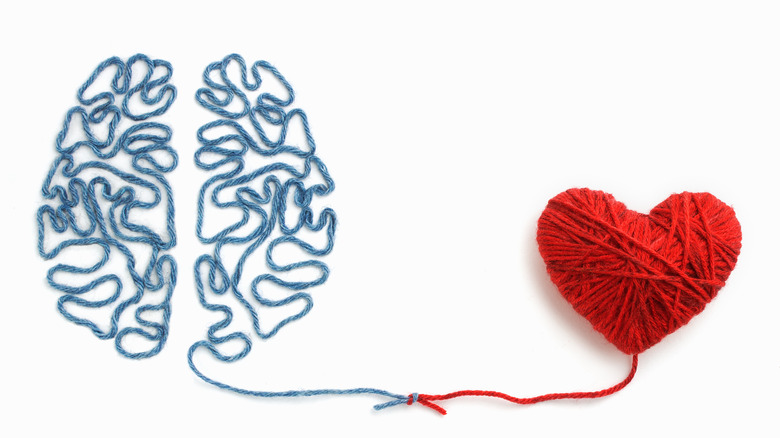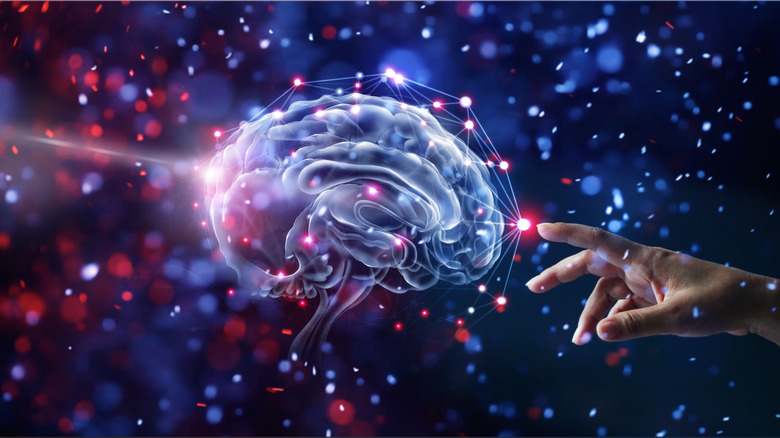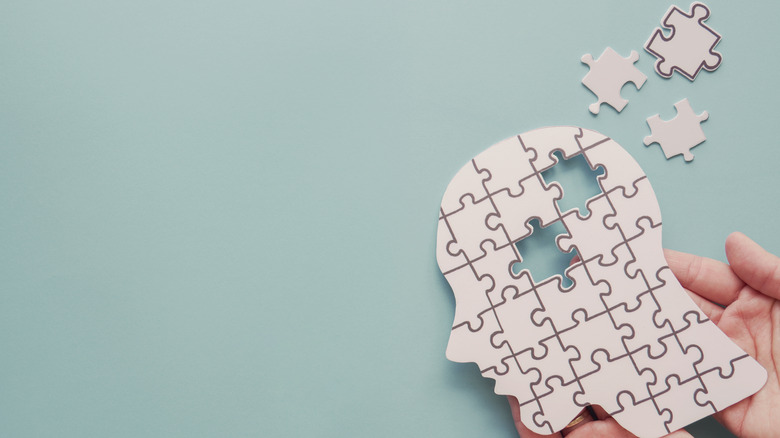This Is What Happens To Your Brain When You Fall In Love
Love is a mystery that may never be solved. But, in the hopes of gaining some insight to this mysterious and significant phenomenon, scientists decided to research the physiology of romance in an unlikely creature: prairie voles. Prairie voles are largely monogamous, unlike their "promiscuous" close relations, montane voles, according to Mental Floss. As The Guardian writes, the North American prairie voles form lifelong bonds after mating and share nest-building and childcare duties, although they may have the occasional extramarital affair. Researchers deemed prairie voles a suitable subject to research due to the strangely striking similarities between human romance and prairie vole romance.
The study took place at Emory University in Atlanta, Georgia, in 2017. Scientists used electrical probes to record female prairie voles' brain activity as they met potential partners, mated for the first time, and started to form lifelong bonds. A key tip-off that such bonds were being formed was "huddling" behavior. "It's kind of like human cuddling," Robert Liu, who was one of the study's lead authors, told The Guardian. "They like to sit side by side and veg out."
Oxytocin and vasopressin hormones are released to build trust and bonds
Multiple social behaviors in humans — including mating behaviors — are linked to the hormones oxytocin and vasopressin, as noted by Mental Floss. Oxytocin plays a key role in childbirth, lactation, and building trust, and it can also have calming effects. Vasopressin regulates kidneys and constricts blood vessels. Both hormones play a role in the behaviors of working together, choosing mates, and picking up on others' emotions. Prairie voles have a higher density of these hormone receptors in the amygdala than the more promiscuous montane voles. The amygdala is the part of the brain that is associated with forming emotional memories.
Both of these hormones are released when prairie voles mate and form bonds. When researchers blocked the release of these hormones, prairie voles became promiscuous. Similarly, montane voles became monogamous when researchers stimulated the release of these hormones via genetic modification.
These findings may suggest that monogamy is promoted by building trust, feeling calm around someone, feeling in tune with a partner's emotions, and working together. In other words, low trust, high emotion, emotional disconnect, and lack of cooperation can weaken and erode a committed relationship.
Dopamine and serotonin are also released, promoting feelings akin to addiction
In one of the experiments, researchers made prairie voles more sensitive to dopamine, which led the voles to create partner preferences more easily without mating, per Mental Floss. Dopamine is released to create pleasant feelings that reward behaviors such as having sex or eating a substantial meal. Scientists also blocked some of the voles' dopamine receptors, which temporarily disabled their ability to form bonds at all.
The research team used optogenetics — shining a light directly onto the brain's surface — to switch on certain brain circuits when female voles were positioned in close proximity to a male without direct contact, as noted by The Guardian. The following day, the female voles' recording behaviors suggested they had formed a bond with the males without direct contact. "The idea of a spark between individuals has been suggested," Robert Liu said. "I'm not sure that's the right term here. It doesn't just happen once, it's probably building up over time."
As voles form bonds, their brains' reward systems go into overdrive and make them want to spend more time with their mate. According to Mental Floss, the dopamine pathways that promote pair bonding in voles also promote cocaine addiction in rodents, which could explain how love can sometimes feel addictive.
The early stages of romance can mess with levels of serotonin and stress molecules
There have been similar studies conducted that measure the effects of love more directly on human brains. According to Mental Floss, a study from the laboratory of psychopharmacology at Italy's University of Pisa linked the beginning stages of romance to lower levels of the neurotransmitter serotonin. Decreased serotonin levels also occur in individuals with obsessive compulsive disorder. In both cases, a serotonin deficit can create anxiety and distracting thoughts.
The early stages of a romance are also associated with increased levels of several molecules related to stress. Both of these effects offer a possible explanation of why the beginnings of a romance can make lovers feel anxious, stressed, and obsessive.
Both serotonin and stress molecules are restored to normal levels after a year to a year and a half into a romantic relationship. So, while the beginnings of a relationship can feel precarious, things may grow more stable after a couple's one-year anniversary.
Brain regions activated in the early stages of romance may explain our impaired judgment
Another study, conducted jointly by researchers at Rutgers University and University College London, also found that romantic love escalates activity in the human brain's dopamine reward system, per Mental Floss. Parental love also activates brain regions associated with the reward system, with the exception of the hypothalamus, which is associated with functions such as controlling body temperature, hunger, and thirst. This finding suggests that the hypothalamus may be responsible for the sexual aspects of romantic love.
The study also found that romance reduced activity in the amygdala, which is associated with fear and learning from mistakes, and the prefrontal cortices, which are associated with analysis, judgment, foresight, and delayed gratification. This finding offers insight into the fact that humans in love often seem to display impaired judgment skills.
All of this physiological research suggests a surprising amount about the psychology of love. The science supports common conceptions that love can make us anxious, addicted, obsessive and even reckless at first. It also suggests that, with time, trust, cooperation, and emotional connection, romantic relationships can grow stable and lasting.




